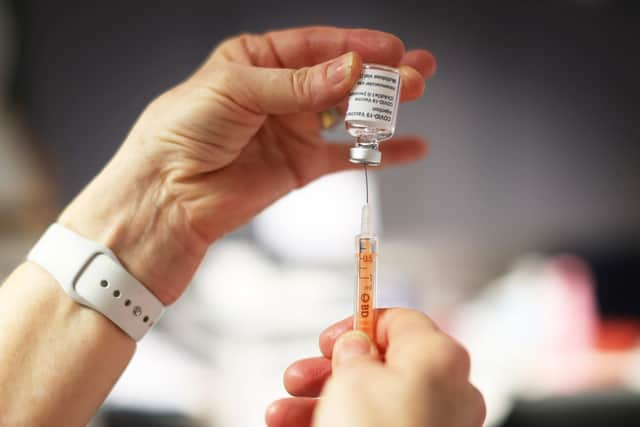NI could see ‘return to some form of normal’ in April thanks to vaccines


That is the view of the British Medical Association’s Northern Ireland chair, Dr Tom Black, who told the News Letter medics here have managed to “hold the line” following the “worst ever pressures” faced by the health service in is entire history.
He said the pressures should begin to ease in the weeks ahead as more and more people are vaccinated.
Advertisement
Hide AdAdvertisement
Hide Ad“We need to get children back to school and we need to get people back to work and the thing that gives us that opportunity is the vaccination programme,” Dr Black added.


“In March we’ll see much greater benefit [from the vaccine roll-out], and then in April we would hope — barring unforeseen problems — we would hope that we could start moving back towards some form of normality for the population.”
He said health workers are exhausted and “fractious” after managing to make it through the extreme pressures from the peak of the coronavirus pandemic this month.
In the autumn, Health Minister Robin Swann had that the health service here was braced for “worst winter in its history”, and in more recent times several experts had predicted the second and third weeks of January would see the most intense pressures.
Advertisement
Hide AdAdvertisement
Hide AdAsked if those predictions had been borne out by what has happened on the front lines, Dr Black told the News Letter: “Yes, absolutely, without a doubt this has been the worst pressure ever faced by the NHS in Northern Ireland.”
Dr Black continued: “The wards and the hospitals have been busier than they’ve ever been, the Covid centres run by the GPs have been busier than they’ve ever been, and in fact I think we did in many areas of the health service reach capacity.
“But the health service worked as a system so when, for example, Daisy Hill and Craigavon ran into problems in the last coupl of weeks a lot of people were transferred to Belfast and some were transferred to the South West Acute Hospital. When Altnagelvin became too busy they had the capacity to work with the system and use the Nightingale and vice versa.”
The BMA NI chair praised medics for their “phenomenal” efforts.
Advertisement
Hide AdAdvertisement
Hide Ad“I think it’s right to say we came very close to being overwhelmed but the message I’m getting back from the doctors is that they are coping,” he said.
“It’s been a tremendous effort and they’re given to work very hard, and it’s difficult work. But they have managed to hold the line.
“Unfortunately, much routine surgery had to be cancelled and some red flag surgery had to be postponed. It’s a matter of coping and trying to get normal services back as soon as possible.
“The service has coped, the service hasn’t been overwhelmed because the service has worked as a system but it has been the busiest we’ve ever seen — the most patients needing intensive care, the most patients needing C-PAP or continuous positive airway pressure on the wards, and the staff have done phenomenal work, phenomenal.”
Advertisement
Hide AdAdvertisement
Hide AdHe said medical staff are now feeling the impact of the past few weeks
“It has worn them out physically and psychologically,” he said. “Everyone’s a little fractious and a little worn out.”
Asked what the health service could expect in the weeks ahead, Dr Black said: “We have a reference group for the four [UK] countries and it’s certainly the view of the experts on that reference group that the vaccination programme is going well, and it will in the first instance reduce the number of patients going into hospital.
“Then from that obviously with a lag period of a couple of weeks we should see a decrease in the number of deaths.”
Advertisement
Hide AdAdvertisement
Hide AdNorthern Ireland’s Chief Medical Officer Dr Michael McBride, meanwhile, described the rol-out as the “long-term route map out of this pandemic”.
The number of Covid-19 vaccines administered in Northern Ireland has now reached 220,201.
The latest figures from the Department of Health show a total of 196,131 first doses and 24,070 second doses.